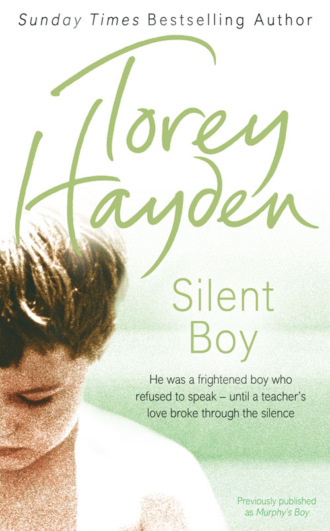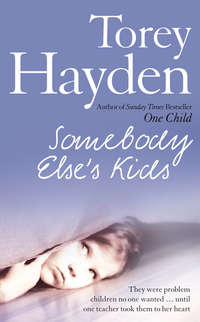
Полная версия
Silent Boy: He was a frightened boy who refused to speak – until a teacher's love broke through the silence
He was a tall youth. It was the first time I’d had a real look at him, and he was a big boy, nearly a man, although an aura of youngness clung to him. He was at least as tall as I was, but thin and frail looking, like a winter cornstalk. Brown hair fell lank over his forehead. Adolescence had ravaged his skin, leaving him with lumpy features and cheeks smothered in acne. Thick-lensed glasses slid down his nose, in spite of a black elastic strap to keep them in place. His eyes were gray and lifeless as a city puddle. He wore church-box clothes, a hopelessly too-small red-checked flannel shirt and gabardine trousers that barely covered the tops of his socks. He looked more like a cartoonist’s caricature of a boy than a real person.
God, he was ugly.
A moment of hopelessness washed over me as I looked at him. Stepping aside, I allowed room for him to pass. Relief flooded his features and he dived past me and under the table.
The chairs went up, seats facing outward, backs tight against the table. I stood watching while he fashioned his cage. He was not shutting me out. He smiled pleasantly at me and gestured in a friendly manner, and I knew it was not me that he felt so compelled to protect himself from. The disquieting fact was that there was no one else in the room, nothing but the walls and the pale sunlight.
I pondered how to work with him, whether to sit on the floor outside the makeshift barricade, as I had in the mirrored therapy room, or whether to join him under the table. After another moment of indecision, I dropped down on my hands and knees and crawled under the table too. He welcomed me with a pleased smile, moved over to make room, of which there wasn’t much, until we both sat hunched together like gnomes in the semi-darkness.
We were only inches from one another. He smelled rather gamey at that distance, and so I just sat for a few minutes, accustoming myself to the lack of light and the cramped space and the odor. Kevin began to rock slightly, his arms clasped tight around his knees, his chin resting atop. He stared at me without wavering.
Well, now what? I really was feeling awfully pessimistic at just that moment. Leaning out, I pulled my box of materials into the cage with us. Taking off the lid, I searched through it for the book we had been reading.
It’s scary, I said to Kevin as I dug through the junk in the box, to start talking when one has been silent so long. But the easiest way to start is to jump right in.
There were other kids, I said, whom I had worked with, who hadn’t been speaking either. I told Kevin about them, of how they had felt before they’d started talking again, of how scary it was the first time and how sure they’d all been that they couldn’t do it. But they could. Every single child had been able to talk in the end, I said, and nothing bad had happened to any of them for it. There was nothing to be frightened of. They all were, because that was the way it felt in the beginning, but there actually was nothing to fear in the end. It was just a feeling.
I spoke in a slow, easy voice, letting it reek with confidence. I lounged back to the extent one could lounge back while sitting under a table with a large fifteen-year-old, so that he could see how relaxed I was, how certain I was of success.
Opening the book, I feigned great interest in it, looking at all the illustrations and I kept talking, oozing self-assurance like a car salesman. Then I laid the book on the carpet. What we’re going to do, I said to him, is have you read to me. Let’s start here.
Kevin looked at me in alarm.
‘Right here, I think,’ I said. ‘I read those chapters yesterday, so we’ll have you start right here. Chapter Seven: The Tide Goes Out.’
Kevin grabbed my arm and shook his head violently. His eyes were dilated wide with horror.
‘Yes, I know. It’s not something you’re used to doing. But that’s okay. Nothing will happen. And everybody’s a little afraid when they first get started. That’s natural.’ I tried to sound very casual, as if this were a most usual thing. Kevin, however, knew it to be highly unusual. He had the look of a frightened horse, that wild, whites-of-the-eyes expression, with his head turned to one side.
Smoothing the pages out, I pointed to the first word. ‘We’ll start with just this one word, okay? Forget the rest of them. Just look at this one. What is it?’
He rocked a little harder and the table shuddered.
‘Here, look at it. This one word. Give it a try.’
Kevin regarded the page. He still had his frightened-horse look. Bringing a hand up, he rubbed his forehead and then pulled his palm down across his face, dragging it out of shape. Then tentatively, he put one finger under the first word.
Seconds passed.
‘What is that word? Look at it. What is it?’
Kevin took a deep breath.
‘The first word is always the hardest one. After that, it’s a cinch. You’ll see.’
He started to rock again. I could hear his breath coming shallowly, the fear rattling up through his throat.
‘Only that first word. That word. How does it start? Come on. Get that word.’
Kevin was taking me seriously. He was going to try. Bringing his other hand down, he ran it along the perimeter of the book, then stopped it to steady the page. Cautiously, as if the book might leap up and nip him, he bent over it until he was hunched almost double. In the gloom under the table, that movement obscured what little light we did have on the page.
He took another deep breath. All the while I kept urging, kept talking to keep the silence at bay. I didn’t want him to hear the silence and know it was stronger than I was.
A third big breath, shakier this time. He lifted his hand and wiped the sweat off on his shirt front. A wet stain had been left where his finger was on the page. Frantically he tried to erase it, and when he couldn’t, he glanced over at me to see what my reaction was. Then he put his hand back over it to cover it.
He needed another minute to rock. It was not easy to do in his hunched position and the whole table shook.
‘Let’s go. Let’s have a try.’
He opened his mouth. No sound, not even a breath.
Seconds drew into minutes. He closed his mouth again.
My constant patter continued. Come on, come on, come on. Let’s go. Let’s try.
Again Kevin began taking breaths in preparation. His mouth opened and closed like a fish’s as he would get ready to try and then lose courage. He started to tap the word with a finger, and that small steady, penetrating sound soon filled up the space around us.
‘Have a go. Come on, Kev, you can do it. I know you can. This is just the way it happens, give it a try.’
A funny noise joined the cacophony of taps and tries. Kevin’s teeth were chattering. At first I had to sit back a little to identify the sound, and that made him look over at me. I could see them chatter. I smiled. Kevin lurched back over the book again with determination. He had begun to believe me. He was going to get that word.
Sweat beaded on his upper lip. His hands shook. Big, dark circles dampened his shirt under his arms and down the center of his back, and the smell was incredible. Still he opened and closed his mouth in abortive tries. He made big, wide circles with it, as if trying to stretch it into working order.
Minute after minute after minute was filled with his grimaces and with my nonstop patter until I felt like we were caught in a time vortex. Kevin undoubtedly thought we were caught in hell. The cords of his neck were taut. Veins stood out at his temples. His face was crimson.
I could hear the mechanical respirations of the black-and-white clock on the wall. Leaning out from under the table, I looked up at it. Twenty–three minutes had passed.
The aide would be returning soon. In an attempt to startle Kevin out of this nonproductive cycle he’d gotten trapped in, I whacked the floor with the flat of my hand. Often enough that worked with other children and we would leap right over the first word. But not this time. Startled, Kevin only bumped his head on the underside of the tabletop. Rubbing it tenderly, he bent forward and attacked the word anew. He brought a hand to his mouth and tried to force his lips into the shape of the word. The word was ‘every’ and soon it required both hands to stretch his lips back into the shape of an e. Sweat dropped from his face down onto the page. The ever-present sound of his teeth chattering echoed in our enclosure.
I slid back out from under the table and sat up straight, rubbing the tense muscles in my back. The thirty minutes were nearly over and we weren’t going to have success. If he hadn’t been trying so desperately, I don’t think I would have felt as disheartened as I did, but it was apparent Kevin cared. Unfortunately, caring wasn’t enough.
‘Well, we’ll call it a day, shall we?’ I said and reached in for the book. ‘It’s not such a big matter that it didn’t work out this time. That happens lots. We’ll try again tomorrow.’
He looked at me. Tears puddled up and then ran down over his cheeks.
Chapter Three
Puzzled, I drove back to the clinic after the session. Kevin appeared to be trying so hard. Very rarely had I had a kid who had tried like that right from the beginning. It made him enjoyable to work with because it was the two of us together against the problem. However, I was not so naïve as not to wonder why. Why would he appear to want to talk again so willingly, if he were able to speak, but was refusing to do so? That didn’t make very good sense. What was his exact problem? How did his lack of speech tie in? Did his fears cause his inability to talk? Or did his failure to speak cause the fears? Or were they even related? Perhaps what nagged at me most was the uncertainty that Kevin could, indeed, talk. If he couldn’t, that clearly would account for why he didn’t. And it probably would account as well for why he was trying so hard, if he believed I could give him a power he did not possess. The lack of information on this boy who had been in and out of institutions for so many years was appalling. Was it possible Kevin had never spoken normally? Could he have been deprived of speech through some accident or organic factor? Was I trying to force him to do something he was physically or mentally incapable of doing? Had he some sort of insidious mental illness like schizophrenia which had stolen speech from him, as it sometimes does?
There were so many questions about this boy. Questions without answers.
‘Someone phoned for you,’ Jeff said when I arrived back in my office at the clinic. He was bent over The New England Journal of Medicine and did not bother to look up.
‘Who was it? Did you answer it?’ I asked. Jeff was loath to answer the phone under most circumstances. A child psychiatrist in his last years of training, Jeff shared a closet-sized office with me, which used to house rats and pigeons when the former occupant, Dr Kirk, was into his rats-and-pigeons phase. The room still smelled a little like a rodent-infested aviary. There were no windows, which did not help the smell any, but we were hardly cut off from the outside. Instead, we had three telephones between the two of us, all with different numbers. His, mine and ours. I had no idea why there were three since the room was too small to accommodate another desk and Dr Kirk, for all his cleverness, had not been training a zoological answering service. But there it was, that third phone, residing on a chair between our two desks, and an odd assortment of calls still came in over it. Consequently, the room was usually alive with ringing. Jeff, if he could help it, never answered any of the three.
I began taking off my jacket. ‘I said, Jeff, did you answer it?’
‘Yes.’ His article must have been awfully riveting.
‘Well, who was it? What did they want?’
‘I don’t know.’ He looked up at last. ‘They hung up.’
My silence was adequate reply.
‘I did too ask! Don’t look at me like that.’
I dropped my box of materials on the desk and slumped into my chair. All along my back the muscles were sore. I hadn’t realized at the time how much I’d been empathizing with Kevin’s distress. For several moments I just sat, letting the muscles relax, not really thinking at all. My eyes rose up the wall in front of me to the confusion of things on my bulletin board. It was kind of a portrait of my mind turned inside out – kids’ drawings, a button in Welsh protesting nuclear energy, four photographs, my calendar with all its visual proof that I did not need a case like Kevin’s, my rotation schedule sheet, a few brightly colored leaves, caught falling from the trees to fulfill that old superstition about good luck for twelve leaves caught in autumn, a gigantic poster of a Cheshire cat, the framed poem in childish hand by one of my former students. Kevin sat at the very back of my mind, pushed there by nothingness. I had meant to ask Jeff’s ideas on the case but I was momentarily drained. I just sat.
Then the phone rang, shattering what little sense I had put back into my head.
We had a community program known as Big Brothers/Big Sisters which was designed to provide underprivileged children, especially those from broken homes, with the chance to enjoy a caring relationship with an adult. I had participated in the program before but had given it up when I was teaching because I didn’t have enough time. Now without a class of my own, without my usual daily fix of rascality, I’d decided to rejoin.
The woman was calling to tell me that they had matched me with an eight-year-old Native American girl. She apologized for not being able to get hold of me sooner because that evening they were holding an open house for the new participants. She hoped very much that I’d be able to make it on such short notice.
She was a scruffy-looking little kid, a bit on the chubby side with grimy chipmunk cheeks and two Band-Aids on her forehead. She wore patched blue corduroy pants, a pink-striped polyester top covered in fuzz balls and a red cardigan with the top button buttoned. Her hair was in two long, fist-thick braids. And I suspect she had more teeth missing from her mouth than were in it. So she hissed like a snake when saying S’s and she sprayed.
‘You my Big Sister?’ she asked as I wandered into the room. We both had name tags on. Hers was upside down. I turned my head to read it. Charity Stands-On-Top.
‘Yup. I’m Torey.’
She gave me a big, toothless grin. We sat down together on one of the long benches. I had a glass of cherry Kool-Aid and two cookies in my hands. Charity had obviously been imbibing already because she had a bright red mustache.
‘Is one of them cookies mine?’ she inquired politely. It hadn’t been. I suspect she had probably already had her quota but I gave it to her anyway. Another huge, face-splitting grin.
‘So, well then, what you gonna do with me?’ she asked, and put the cookie whole into her mouth. ‘Where you gonna take me? My other Big Sister, Diana, she used to take me to the movies. You gonna take me to the movies?’
‘Maybe,’ I said.
‘Well, then, I got to have popcorn – buttered popcorn – when I go to the movies. And a big-sized Pepsi. Or maybe Coke. That’d be okay too. And one of them big suckers that lasts long. And a box of jelly Dots. Diana, she used to buy me all of them things. Every time.’
‘I see.’
‘She used to buy me other stuff too. You gonna buy me stuff?’
‘What sort of stuff?’
She shrugged. ‘Just stuff,’ she answered ambiguously and eyed the remainder of my other cookie. ‘Good stuff,’ she continued when I offered no comment and no cookie. ‘You know. Not clothes or anything. I ain’t a poor kid. You don’t have to go buying me no clothes. What I need’s good stuff. Like once, Diana bought me this Tonka truck. You know. One of them real big ones that you can sit on and dig up the yard.’
‘Oh. I see.’
‘Her name was Diana. Did I tell you that? What’s your name again?’
‘Torey.’
‘Oh yeah. I forgot. That’s a weird name. Where’d you get a weird name like that at?’
‘It’s from Victoria.’
‘Oh. That’s an even weirder name.’ Charity looked me over in a very appraising manner and I felt like a piece of livestock at an auction.
‘I thought you’d be prettier,’ she said at last.
Not knowing exactly how to field that one, I just shrugged.
‘You got funny-looking eyes. Why are they that color? Do you wear contact lenses?’
‘No.’
‘Diana did. She was practically blind. And they kept falling out. Once they dropped right out and we had to look all over the floor at Woolworth’s on our hands and knees and then this guy comes in and he goes CRUNCH!’ Charity fell about with laughter. I finished my Kool-Aid.
‘You don’t got much to say, do you?’ she said to me. ‘You got a funny voice. Is that why? Are you embarrassed? Where did you get your funny voice at? Is something wrong with it?’
‘I don’t think so. I was born with it.’
There was a long, long pause while Charity regarded me further. Then she shook her head with resignation. ‘You really aren’t very interesting, are you?’
I could hardly have described Charity that way. Full of cheeky arrogance and a surety about herself that was intimidating, Charity was convinced she owned the world. Five minutes with her and I knew that. I also knew that if Charity had been the first kid I’d ever met, I’d probably not have chosen a career working with children.
I supposed she was a street kid, wiser at eight than I’d be at eighty. She had that streetwise air about her, the confidence that shifting for oneself gives. Yet she was terribly disarming with her chubby cheeks and her Band-Aids and her huge, gaping grin.
‘So,’ she said, her mouth full with a cookie she’d charmed off the refreshments lady, ‘what do you do when you ain’t here?’
‘I work. With kids.’
‘Oh? What kind of kids? Where at? Do I know ’em?’
‘I work at the Sandry Clinic.’
‘Ohhhhhh,’ she replied with a wise nod. ‘Them kind of kids. What’s the matter with your kids? They jump up and down? My brother jumps up and down and he wets the bed. He went to one of them places once. But you know what? It didn’t do no good. He still wets the bed.’
‘That happens sometimes.’
‘So what they like, your kids? What do they do?’
I told her about Kevin. I would hardly have expected myself to, but I did. I told how this boy had lived in a treatment home all these years and how he hadn’t talked in ever so long a time. I told how we sat together under the table and tried to read. The strength of Kevin’s fears came back to me, and I tried to describe to Charity what it had been like being with him when he was so afraid.
Charity was leaning forward, her chin in her hands. She listened carefully. ‘Why do you go to work with him?’ she asked.
‘Because that’s what my job is.’
‘He sounds weird to me.’
‘He is weird. But that’s okay. I don’t mind that.’
‘Can I meet him sometimes? Will you take me to meet him?’
‘Maybe. Someday maybe.’
‘He’d talk to me. I’d say, “Kid, you don’t have to be scared of me. I’m just a little kid.” Then he’d talk to me.’
‘The trouble is,’ I said, ‘we don’t even know if he can talk. Maybe we’re trying to make him do something he can’t really do.’
‘How come you don’t know?’
‘Because we don’t know,’ I replied, feeling a little exasperated. ‘That’s how come.’
A look of disdain crossed her face and she leaned back on the bench. ‘You’re silly. That’s the silliest thing I ever heard.’
‘What is? Why?’
‘Well, how come if you don’t know, you don’t ask him? How come you don’t just say, “Kid, can you talk?” Then you’d know.’ She smiled affably. ‘How you supposed to know, if you don’t ask?’
Chapter Four
The staff behind the front desk at Garson Gayer were beginning to recognize me. They called Hello to me from behind their glass partition as I came past. When I went in the back room to get a cup of coffee, I could hear one woman tell the other who I was: Zoo-boy’s therapist. Come to try and make him talk, she said, and I could tell from her tone of voice that she didn’t think it would happen. I hung up my jacket and went on down to the small white room. I didn’t even have the secretaries fooled.
Kevin and I had no more success this second try than we had had the day before. The only variation was that the tears came sooner. Over his pimply cheeks, down onto his chin they rolled to drip off onto the book where he would rub them out furiously with his fingers, leaving big smeary blobs on the paper. However, never once did the tears deter him. He kept trying. Long after I was ready to give up, long after the whole enterprise took on a dreary, somewhat perverse mood, Kevin kept trying, kept laboring away to get cooperation out of his voice and his mouth and his heart. And he kept failing.
The hell was not Kevin’s alone. It had fast become mine as well. I felt as trapped in his fears as I did in the table-and-chairs cage. There was an odd, deviant feel to his efforts because, while he tried so hard, futility was draped over us as tangibly as a cloak. I could not shake it off. Like Sisyphus rolling his huge stone to the hilltop, Kevin continued to struggle but with the foregone conclusion that regardless of the effort, the stone would go rolling back down again. That was the perversity of it to me, that he could appear to try so hard and still emanate such hopelessness.
Every muscle in my body grew rigid. I had a headache from clenching my teeth too tightly. My own voice faltered. I had urged and coaxed and cajoled until even coffee could not lubricate my throat enough.
Kevin trembled. His shoulders shook. Even his head shook. I could hear fear-torn breath come through chattering teeth. And all the effort was in vain.
Finally I put my hand over the book. Our time was nearly up. ‘We’ll try again tomorrow, okay?’
He regarded me wistfully. His chin trembled a little more.
‘We’ll get it done, Kevin. Don’t worry.’
But clearly he did.
‘Kevin, I want to ask you something.’
He watched me.
‘Can you talk? I mean, can you? Are you able to?’
His eyes fell. To the carpet. To the book. To his hands. A great silence loomed up which was both divisive, putting infinity between us, and binding. For a boy who said nothing, he certainly left nothing unsaid.
‘Kevin?’
He gestured. I didn’t understand. He gestured again and grimaced, frustration sharpening the movements of his hands. But I was stupid. Disgruntled, he smacked the floor with his fingers, and we sat again in silence.
‘Can you, Kevin?’
His eyes came back to me, back to meet my eyes. He nodded.
‘You can?’
He shrugged.
‘You can, though. You can talk? You can but you don’t? You won’t? Is it something like that?’
An incomplete gesture with one hand and then he dropped it. He shrugged again and stared only at the carpet.
‘Why don’t you then?’
He began to cry, his mouth dragged down in misery. I thought to put my arms around him and comfort him but I didn’t. I shouldn’t. The silence between us told me that much, so I just sat, my hands in my lap. Kevin only wept harder, his big man-sized fingers locking and unlocking. His shoulders shook. But no sound came from him.
On my way back to the clinic from Garson Gayer, I stopped in town to pick up some labels from the printer’s. As I was walking down the street toward the print shop, I passed a drugstore window filled with an array of Halloween decorations for sale. I had gone completely by the store before being pulled back to pause and gaze at the display. Black cats on pumpkins, honeycomb jack-o’-lanterns, glow-in-the-dark skeletons, ghost lapel pins, a book of Pumpkin carols and other Peanuts memorabilia lined the window.








